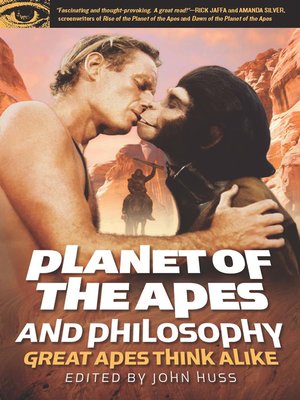Planet of the Apes and Philosophy
ebook ∣ Great Apes Think Alike · Popular Culture and Philosophy
By John Huss

Sign up to save your library
With an OverDrive account, you can save your favorite libraries for at-a-glance information about availability. Find out more about OverDrive accounts.
Find this title in Libby, the library reading app by OverDrive.



Search for a digital library with this title
Title found at these libraries:
| Library Name | Distance |
|---|---|
| Loading... |
What makes humans different from other animals, what humans are entitled to do to other species, whether time travel is possible, what limits should be placed on science and technology, the morality and practicality of genetic engineering—these are just some of the philosophical problems raised by Planet of the Apes.
Planet of the Apes and Philosophy looks at all the deeper issues involved in the Planet of the Apes stories. It covers the entire franchise, from Pierre Boulle's 1963 novel Monkey Planet to the successful 2012 reboot Rise of the Planet of the Apes. The chapters reflect diverse points of view, philosophical, religious, and scientific.
The ethical relations of humans with animals are explored in several chapters, with entertaining and incisive observations on animal intelligence, animal rights, and human-animal interaction. Genetic engineering is changing humans, animals, and plants, raising new questions about the morality of such interventions. The scientific recognition that humans and chimps share 99 percent of their genes makes a future in which non-human animals acquire greater importance a distinct possibility.
Planet of the Apes is the most resonant of all scientific apocalypse myths.|
What makes humans different from other animals, what humans are entitled to do to other species, whether time travel is possible, what limits should be placed on science and technology, the morality and practicality of genetic engineering—these are just some of the philosophical problems raised by Planet of the Apes.
Planet of the Apes and Philosophy looks at all the deeper issues involved in the Planet of the Apes stories. It covers the entire franchise, from Pierre Boulle's 1963 novel Monkey Planet to the successful 2012 reboot Rise of the Planet of the Apes. The chapters reflect diverse points of view, philosophical, religious, and scientific.
The ethical relations of humans with animals are explored in several chapters, with entertaining and incisive observations on animal intelligence, animal rights, and human-animal interaction. Genetic engineering is changing humans, animals, and plants, raising new questions about the morality of such interventions. The scientific recognition that humans and chimps share 99 percent of their genes makes a future in which non-human animals acquire greater importance a distinct possibility.
Planet of the Apes is the most resonant of all scientific apocalypse myths.







